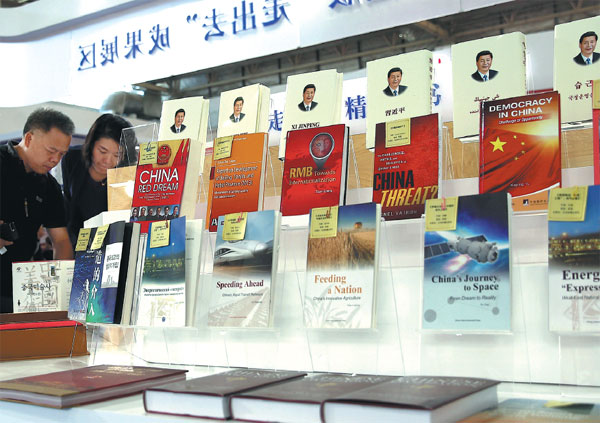IN BRIEF (Page 2)

| Clockwise from top: Bionic jellyfish, a gobang robot and a sketch-drawing robot are demonstrated at the 2017 World Robot Conference in Beijing on Aug 23. Wang Zhuangfei / China Daily |
Effort to marry robotics, AI to aid manufacturing
China will ramp up efforts to integrate artificial intelligence technologies into robots as the country aims to gain a lead in the race toward a smarter, automated society and accelerate the use of industrial and service robots. Vice-Premier Liu Yandong said on Aug 23 at the opening ceremony of the 2017 World Robot Conference in Beijing. As robotics becomes increasingly intertwined with AI, big data and other technologies, the sector will play a significant role in driving economic growth in China, Liu said. In July, China unveiled a national development plan to build a 1 trillion yuan ($147.9 billion; 127 billion euros; £117 billion) AI core industry by 2030, which is supposed to stimulate as much as 10 trillion yuan of related businesses. The application of AI technologies in robotics is an integral part of that ambitious goal.
Shipbuilders outperform South Korean rivals
Co confirmed on Aug 22 that the company and Hudong-Zhonghua Shipbuilding (Group) Co, another Shanghai-based shipyard, together have received a letter of intent from the French group CMACGM SA for nine vessels capable of transporting 22,000 twenty-foot-equivalent-unit containers - the largest carrying capacity in the world. Shipbuilders in China received orders for new vessels with a collective capacity of 8.14 million dead weight metric tons in the first half of 2017, accounting for 31.4 percent of the global market, outperforming South Korea's shipbuilding industry, which held a 30.6 percent share, data from the Beijing-based China Association of the National Shipbuilding Industry shows.
Pakistan eager to proceed with projects
Pakistan wants to work with China to ensure the earliest implementation of the Gwadar Port project, as it is "extremely important" for people of that area as well as for the entire country, Pakistani Foreign Secretary Tehmina Janjua said on Aug 22, during her first visit to China, from Aug 21 to 23, after taking up her post in March. "It should be a symbol that indicates the close relationship between our two countries, as well as how this relationship affects the people of Pakistan," she said. "China and Pakistan are not only iron brothers, as President Xi Jinping has said, but also steel sisters."
Nation glad to train foreign astronauts
China is willing to help other nations select and train astronauts and will gladly cooperate with them in its space station program, Yang Liwei, deputy head of the China Manned Space Engineering Office and the first Chinese in space, said on Aug 22. More than 10 countries, mostly developing, have asked for China's assistance in selecting and training astronauts, according to Yang. "It normally takes about four years to train a Chinese astronaut. The time needed to train a qualified foreign astronaut will vary based on each candidate's individual situation," he said. "Considering that we will have our own space station in about four years, now is the time to begin such training for nations interested in joining our space station program."
Chinese woman slain in Japan
The Chinese embassy in Japan said on Aug 22 that it has asked Japanese police to solve the case of the killing of a Chinese citizen as quickly as possible, after reports emerged that a Chinese woman had been slain in a dorm in Japan. The woman was killed in Fuji, Shizuoka prefecture, on Aug 21 evening, the embassy said, adding that it has contacted authorities in China to look for relatives of the victim. The 35-year-old Chinese woman and a Chinese man in his 20s were found lying and bleeding in a company's dorm room in Fuji on Aug 21, the Yomiuri Shimbun newspaper reported. The woman was dead when police arrived at the scene. The man was taken to a hospital. A bloody knife was left in the room, according to the report.
Military says quality of recruits is 'guaranteed'
The Chinese military has dismissed speculation that unhealthy applicants are entering the armed forces, and has reassured the public about the quality of new recruits. "Recruitment is the foundation of national defense, and high-quality recruits are crucial to the military's combat capability," the Defense Ministry's recruitment office said in an online statement on Aug 22. People's Liberation Army Daily said about 56 percent of those who applied to join the army in an unnamed city this year failed to meet physical standards. The military eliminates unfit applicants who fail rigorous physical examinations, it said, adding that recent public worries about the quality of recruits were the result of people mistakenly assuming that an increase in the number of rejected applicants meant there were more subpar recruits.
Rewards go up for whistleblowers
Chinese authorities announced on Aug 22 that cash rewards would be increased for whistleblowers who report on issues of food safety, drugs, cosmetics, health products and medical equipment. The China Food and Drug Administration and the Ministry of Finance said a single tip will be rewarded with up to 500,000 yuan ($75,000; 63,772 euros; £58,507) instead of the previous limit of 300,000 yuan. The identities of informants should be strictly protected, they said.
20 awards honor service to China books
For contributions promoting Chinese books and writings to global audiences, 20 international authors, translators and publishers were honored in Beijing with the Special Book Award of China on Aug 22. Vice-Premier Liu Yandong presented the awards in the ceremony, which also marked the opening of the 24th Beijing International Book Fair. The fair, the world's second-largest, has attracted 2,500 publishers from 89 countries and regions, and they brought 300,000 titles. One of the winners was British translator Paul White, who has been working with China International Publishing Group for 31 years. Among the books he worked on are Xi Jinping: The Governance of China and The Chinese Path and the Chinese Dream.
Laser to uncover secrets of universe
China is building a laser 20 times stronger than the most powerful one now in use to probe the secrets of the universe and create new materials for a wide array of products. Last year, the Shanghai Institute of Optics and Fine Mechanics created the world's highest peak power pulsed lasers - intense lasers that generate beams in extremely short bursts - clocking in at 5.3 quadrillion watts (a quadrillion is 1 followed by 15 zeros) in less than 30 quadrillionths of a second. Now, it is building an even stronger one, which can produce 100 quadrillion watts - about 50,000 times the planet's total power consumption - in an extremely short time, says Li Ruxin, project leader and director of the institute, which is part of the Chinese Academy of Sciences. The laser is part of a new laboratory called Station of Extreme Light at the Shanghai Coherent Light Facility.
Xiongan New Area looks good in survey
Xiongan New Area has a stable geologic structure, good for ground construction and underground infrastructure, as well as vast farmland and groundwater resources, according to the first phase of a geological survey. Over 1,700 experts from China Geological Survey, a research bureau under the Ministry of Land and Resources, have participated in the first phase of the survey, which covered 1,770 square kilometers in the region. They concluded that 89.5 percent of the surveyed land is geologically stable and "suitable or relatively suitable for construction", but they warned that authorities should be aware of the land subsidence. There is no heavy metal pollution on 99.3 percent of the land, 1,533 hectares is good farmland, and 573 hectares were found to be rich in selenium, an essential trace element that is good for human health.
Delegates: Tibetan Buddhism thrives
Tibetan Buddhism has never been better than it is today, said a Tibetologist in Tokyo. Zhou Wei, director of the China Tibetology Research Center's Religion Research Institute, who led the delegation of a traditional Tibetan medicine specialist, three Tibetan officials and a Living Buddha on a visit to Japan, told Japanese lawmakers and reporters that Tibet has more than 1,700 temples with about 46,000 monks. Among them are nearly 400 Living Buddhas. Zhou said that thanks to the central government's support, Tibetan Buddhism has developed normally and infrastructure facilities such as roads, electricity and communications for the temples have been built. All monks in Tibet are now covered by its social welfare system. Also, the government has established Tibetan Buddhism educational institutions to train young monks and has taken good care of preserving and expanding Tibetan Buddhism culture.
Phone booths to be reborn as libraries
More than 260 public phone booths - which have become obsolete in the age of mobile devices - will be turned into mini-libraries in Shanghai's downtown Xuhui district, according to the district's cultural bureau. There will be six types of booths, including library booths, celebrity exhibition booths and electronic booths. More than 60 books will be placed in a vending machine in each booth, allowing residents to borrow and return books around the clock. The booths, which are near the figures' former residences, will be revamped to provide information about them. People will be able to read books and browse digital albums to learn about them.
| The 24th Beijing International Book Fair, which opened on Aug 23, presents over 300,000 books from 89 countries during its five days. Zou Hong / China Daily |
(China Daily Africa Weekly 08/25/2017 page2)
Today's Top News
- Foreign ministers of China, Egypt call for Gaza progress
- Shield machine achieves Yangtze tunnel milestone
- Expanding domestic demand a strategic move to sustain high-quality development
- Xi hears report from Macao SAR chief executive
- Xi hears report from HKSAR chief executive
- UN envoy calls on Japan to retract Taiwan comments
































